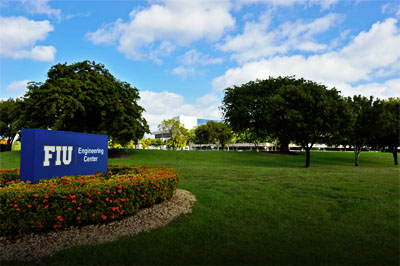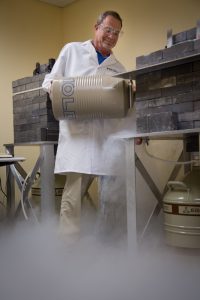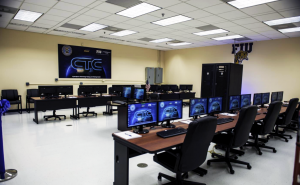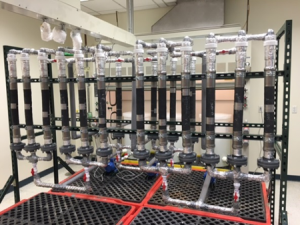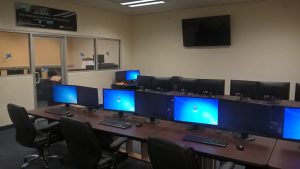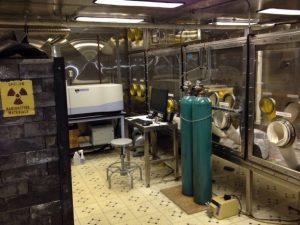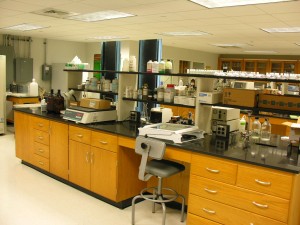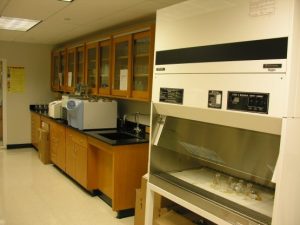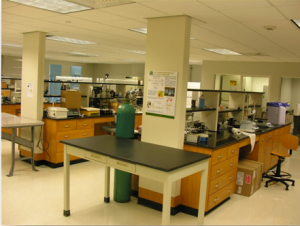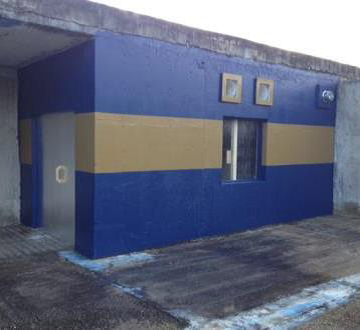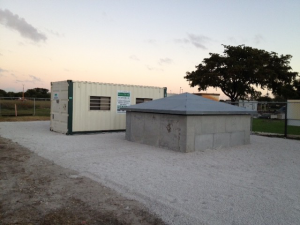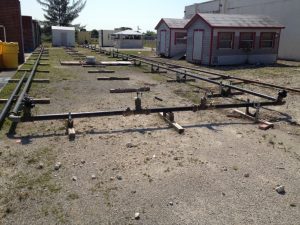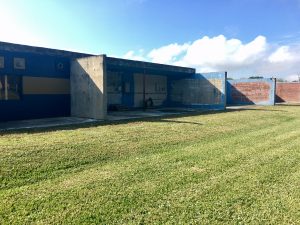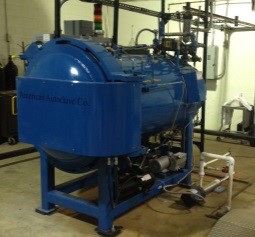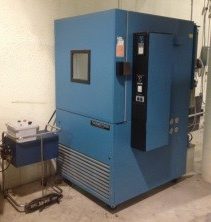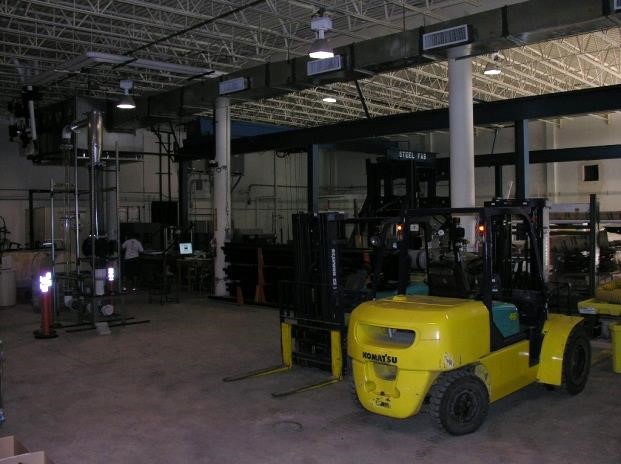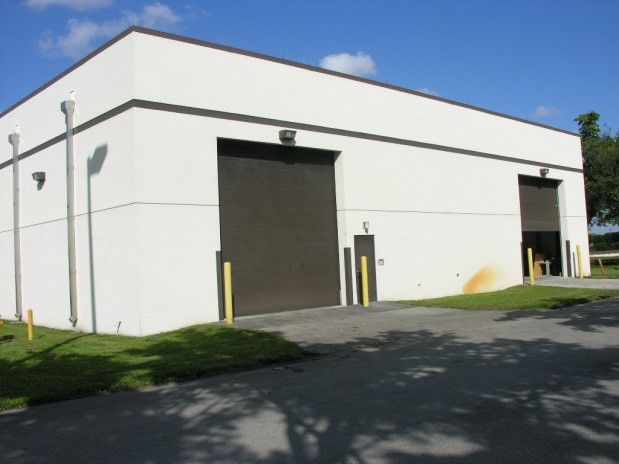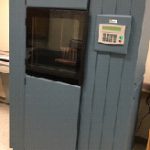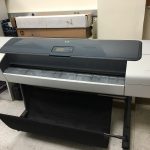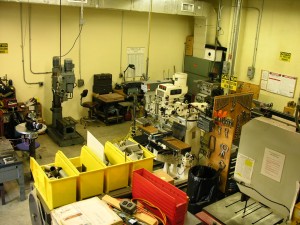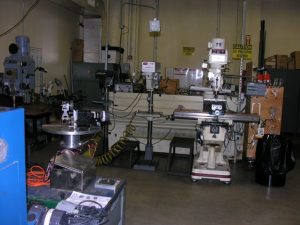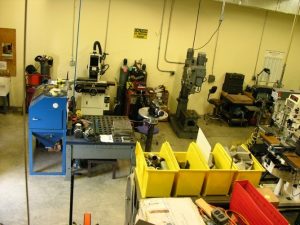Environmental Radiochemistry Laboratory
The Environmental Radiochemistry Lab analyzes marine and terrestrial samples for naturally occurring and anthropogenic radioactivity for the purpose of tracing the pathways and discovering the rates of various environmental processes. Because naturally occurring radioisotopes have half-lives ranging from seconds to many years, it is possible to study processes that encompass a great variety of temporal and spatial scales. Our lab measures 210Pb, 234Th, 238Th,226Ra, 223Ra, 224Ra ,228Ra, 7Be, 222Rn and other species in water, air and sediment.
Composites Laboratory
The composites lab supports current research efforts for the FAA and ONR related to adhesive bonding of composite structures. The lab houses the necessary materials including pregregs, peel ply and adhesives and includes work stations for creating lay ups used in developing coupons. Large scale coupons are utilized in contamination studies and surface preparation analysis and mirco-scale coupons are used for fracture analysis and the development of health monitoring methods. The lab also has a suite of analytical equipment to assess material properties that includes a DSC, TGA and TMA, an AFM and an analytical balance.
Cyber Technology, Testing, and Training Laboratory (CT3L)
FIU-ARC performs cyberspace technology research, testing and training of workforce through a multi-disciplinary STEAM program at FIU. The CT3L provides a state-of-the-art test bed with servers, security tools, and network infrastructure to simulate, monitor, and provide response to real life security threats. CT3L optimizes resource allocation, monitoring, and provisioning for proactive threat prevention to mitigate network and infrastructure risks.
Additionally, the CT3L provides a platform to develop, test, and measure autonomous system-of-systems such as virtual TENA environments.
Materials Laboratory
Currently the Materials Lab is being used for long term age testing of nonmetallic materials used in the United States Department of Energy’s Hanford Site Tank Farm waste transfer system. These materials include the inner primary hoses in the hose-in-hose transfer lines, Garlock® gaskets, ethylene propylene diene monomer (EPDM) O-rings, and other nonmetallic materials. These nonmetallic materials are exposed to caustic solutions as well as high temperatures and pressure stressors.
Modeling, Simulation & GIS Research Laboratory
The Applied Research Center’s (ARC’s) strategic goal is to create a top-tier, state-of-the-art facility within Florida International University (FIU) with infrastructure to support modeling, simulation & geographic information systems (GIS) research. The objective is to build a Modeling, Simulation and GIS Research Laboratory located at FIU’s Engineering Campus Center that will facilitate implementation of FIU-ARC’s research and development activities and support FIU staff, students and faculty. Research conducted in the laboratory will focus on geospatial, hydrological, hydrodynamic and water quality modeling and information systems for land and water resources management; thermodynamic speciation modeling; solute transport modeling; and modeling of computational fluid dynamics, involving ARC staff, FIU faculty (e.g. at the Department of Earth and Environment, Civil and Environmental Engineering, SERC, Biology and other related fields of study) and students.
Radiological Laboratory
The Radiological Laboratory is equipped with state-of-the-art glove boxes, a three-stage HEPA+activated charcoal filtration system, a fume hood, and a lead brick shielded enclosure for conducting studies on any material emitting alpha, beta, or gamma radiation. An enormous glovebox with multiple gloves and ports allows for multiple projects with radioactivity to be done simultaneously.
The entire laboratory is housed in a 20’ x 24’ Permacon facility with a portable filtration system to prevent the spread of particulate contamination in the laboratory air. A HEPA filter system protects all air exiting the facility.
FIU has a Radioactive Materials License (no. 2846-1) from the Florida Department of Health, Bureau of Radiation Control, to procure and use many radionuclides including uranium, thorium, radium, and their decay products; certain transuranics; activation products; and fission products in addition to other generally licensed radioactive materials, such as calibration devices and sources.
Soil and Groundwater Laboratory
This laboratory includes an analytical scale, centrifuge, gas chromatography equipment, biosafety hood, autoclave, oven, incubator, freezer and multiple refrigerators. It also includes two gloveboxes for conducting contained work including anaerobic and oxygen-restricted experiments. This equipment allows for a range of experiments investigating the environmental fate and transport of contaminants as well as the effect of remediation technologies on the subsurface.
Technology Testing & Demonstration Facility
Technology Testing & Demonstration Facility located on the north end of the College of Engineering campus support technology assessment and technology development activities. This facility is used for performing technology testing and demonstrations as part of the DOE EM project research. A “hot cell” mockup facility is available in this area to support remote technology deployment for hot cell cleanup activities. As part of the FY11 (FIU Year 2) research effort, and in collaboration with Savannah River National Laboratory, a 10 ft x 10 ft by 8 ft mock-up “canyon pit” experimental facility was built to support remote sensor networks evaluation for large scale in situ decommissioning efforts.
Multi-functional Indoor Testing Facility
The 3,125-square-foot high-bay building is the primary laboratory resource utilized for several of the meso-scale experiments performed as part of this DOE-EM research effort. Designed as an industrial workplace, this facility hosts many multi-disciplinary projects, ranging in scope from technology assessments to waste transfer studies. The facility includes a high-pressure autoclave and an environmental chamber for material preparation and testing, a mock-up facility for in-situ decommissioning experimental work, a 25-ft pipeline mockup rig for controlled testing of plugging/unplugging technologies for high-level waste retrieval lines, and several additional experimental setups for high-level waste rheology and instrumentation evaluation. The infrastructure assets include:
- 50kVA comprised of 240V three phase, 240V single phase, 208V three phase and 480V three phase
- compressed air
- canopy exhaust hood
Engineering Design Center
The Engineering Design Center provides full service engineering design and 3-D prototype fabrication services to both internal and external clients.
Services include:
- Engineering design
- Drafting and large scale plotting
- 3-D printing
Equipment
- Stratasys ® FDM Vantage™ 3-D printer with a resolution/slice height capability of 0.005” (0.127mm) and a build envelope size of (W x L x H): 14 x 10 x 10 in (355 x 254 x 254 cm)
- Hewlett Packard Designjet T610 large format printer that is capable of printing on paper up to 44” wide
Machine Shop
The Machine Shop provides full-service machining and fabrication services for prototype manufacture, modification, and small-scale production of devices for ARC R&D projects and outside clients. The shop performs lathe operations, three-dimensional computer numerically controlled milling, precision drilling, cutting, welding, fabrication and assembly.
Select equipment includes:
- 21” x 80” engine lathe
- 16” x 40” engine lathe
- Radial-arm drill press
- 10” x 54” vertical mill with 3-dimensional CNC capability and horizontal mill adapter
- Hydraulic-feed band saw with a 23” throat
Gallery

